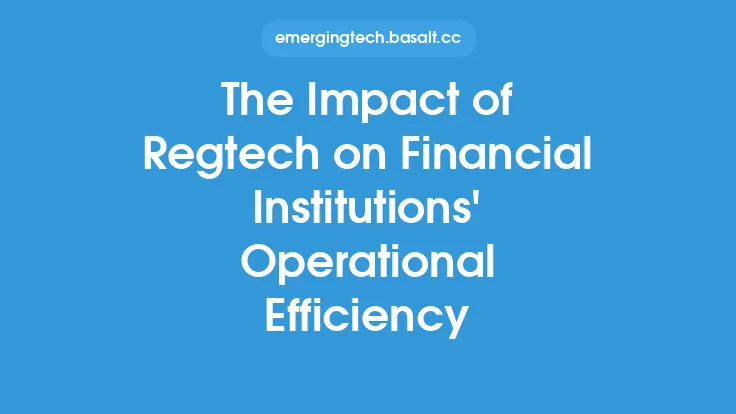The financial sector has undergone significant transformations in recent years, driven in part by the advent of innovative technologies and regulatory requirements. One of the key areas where this intersection of technology and regulation is most pronounced is in the realm of regtech, short for regulatory technology. Regtech solutions are designed to help financial institutions manage the complex and ever-evolving landscape of regulatory requirements more efficiently and effectively. Among the various forms regtech solutions can take, cloud-based regtech solutions have emerged as particularly beneficial for financial institutions. This is due to their scalability, flexibility, and cost-effectiveness, among other advantages.
Introduction to Cloud-Based Regtech Solutions
Cloud-based regtech solutions leverage cloud computing to provide financial institutions with the tools and platforms they need to comply with regulatory demands. These solutions can range from data analytics and reporting tools to compliance management software and risk assessment platforms. By hosting these solutions in the cloud, financial institutions can access them on-demand, without the need for significant upfront investments in hardware or software. This approach not only reduces costs but also enhances the ability of institutions to quickly adapt to changing regulatory environments.
Scalability and Flexibility
One of the primary benefits of cloud-based regtech solutions is their scalability. Financial institutions can quickly scale up or down to meet changing regulatory requirements or business needs, without having to worry about the limitations of their internal infrastructure. This scalability is particularly important in the context of regtech, where the volume and complexity of regulatory data can fluctuate significantly. For instance, during periods of heightened regulatory scrutiny, institutions may need to rapidly increase their capacity to process and analyze large datasets, a task that cloud-based solutions can handle with ease.
Cost-Effectiveness
The cost-effectiveness of cloud-based regtech solutions is another significant advantage. By adopting a cloud-based model, financial institutions can shift from capital expenditures (CapEx) to operational expenditures (OpEx), paying only for the resources they use. This approach eliminates the need for large upfront investments in infrastructure and reduces the costs associated with maintenance, upgrades, and support. Moreover, cloud providers often offer economies of scale, further reducing the cost per user or per transaction. This can be particularly beneficial for smaller financial institutions or those with limited IT budgets, allowing them to access advanced regtech capabilities that might otherwise be out of reach.
Enhanced Security and Compliance
Despite initial concerns about the security of cloud computing, modern cloud-based regtech solutions offer robust security features that meet or exceed the standards of on-premise solutions. Cloud providers invest heavily in security measures, including encryption, access controls, and monitoring, to protect data and ensure compliance with regulatory requirements. Additionally, cloud-based solutions can be designed with compliance in mind from the outset, incorporating features such as data segregation, audit trails, and compliance reporting to help financial institutions demonstrate their adherence to regulatory standards.
Data Analytics and Insights
Cloud-based regtech solutions often come with advanced data analytics capabilities, enabling financial institutions to gain deeper insights into their regulatory compliance posture. By analyzing large datasets and identifying trends and patterns, institutions can proactively manage risks, optimize compliance processes, and make informed decisions. These analytics capabilities can also help in predicting and preparing for future regulatory changes, allowing institutions to stay ahead of the curve. The use of machine learning and artificial intelligence within these solutions can further enhance their ability to detect anomalies, predict compliance risks, and automate reporting and compliance tasks.
Implementation and Integration
The implementation and integration of cloud-based regtech solutions can be relatively straightforward, especially when compared to the deployment of on-premise systems. Cloud solutions typically offer standardized APIs and integration tools, making it easier to connect them with existing systems and workflows. This facilitates a seamless exchange of data and ensures that regtech solutions can be fully leveraged without disrupting ongoing operations. Moreover, many cloud providers offer professional services and support to guide institutions through the implementation process, ensuring a smooth transition to the new solution.
Future of Cloud-Based Regtech
As the financial sector continues to evolve, the role of cloud-based regtech solutions is likely to expand. Advances in technology, such as the increased use of artificial intelligence and blockchain, will introduce new capabilities and efficiencies into regtech solutions. Furthermore, the growing recognition of the benefits of regtech, coupled with increasing regulatory pressures, will drive more financial institutions to adopt cloud-based solutions. The future of regtech is closely tied to the cloud, with institutions leveraging cloud computing to navigate the complex regulatory landscape more effectively, efficiently, and innovatively.
Conclusion
Cloud-based regtech solutions offer a powerful tool for financial institutions seeking to enhance their regulatory compliance and risk management capabilities. With their scalability, cost-effectiveness, enhanced security, and advanced data analytics, these solutions are well-positioned to meet the evolving needs of the financial sector. As regtech continues to play a critical role in shaping the future of financial regulation, the adoption of cloud-based solutions will be instrumental in helping institutions navigate this complex and ever-changing landscape. By embracing cloud-based regtech, financial institutions can not only ensure compliance with current regulatory requirements but also position themselves for success in a future marked by technological innovation and regulatory evolution.





